《雨霖铃》许渊冲译版
- 格式:doc
- 大小:27.50 KB
- 文档页数:2
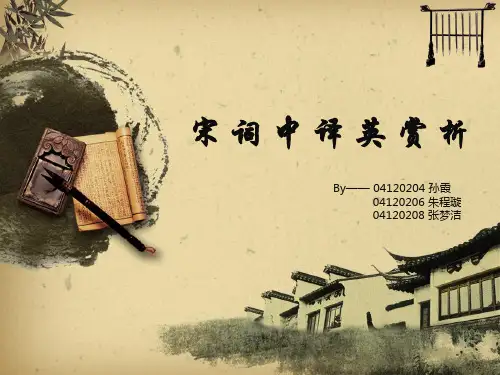
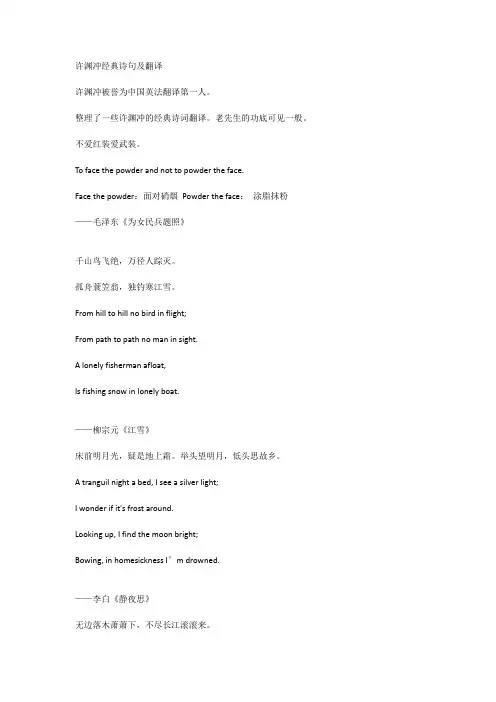
许渊冲经典诗句及翻译许渊冲被誉为中国英法翻译第一人。
整理了一些许渊冲的经典诗词翻译。
老先生的功底可见一般。
不爱红装爱武装。
To face the powder and not to powder the face.Face the powder:面对硝烟Powder the face:涂脂抹粉——毛泽东《为女民兵题照》千山鸟飞绝,万径人踪灭。
孤舟蓑笠翁,独钓寒江雪。
From hill to hill no bird in flight;From path to path no man in sight.A lonely fisherman afloat,Is fishing snow in lonely boat.——柳宗元《江雪》床前明月光,疑是地上霜。
举头望明月,低头思故乡。
A tranguil night a bed, I see a silver light;I wonder if it's frost around.Looking up, I find the moon bright;Bowing, in homesickness I’m drowned.——李白《静夜思》无边落木萧萧下,不尽长江滚滚来。
The boundless forest sheds its leaves shower by shower; The endless river rolls its waves hour after hour.——杜甫《登高》葡萄美酒夜光杯,欲饮琵琶马上催。
With wine of grapes the cups of jade would glow at night,Drinking to pipa songs, we are summoned to fight.——王翰《凉州词》寻寻觅觅,冷冷清清,凄凄惨惨戚戚。
I look for what I miss, I know not what it is,I feel so sad, so drear, so lonely, without cheer.——李清照《声声慢》天高云淡,望断南飞雁。
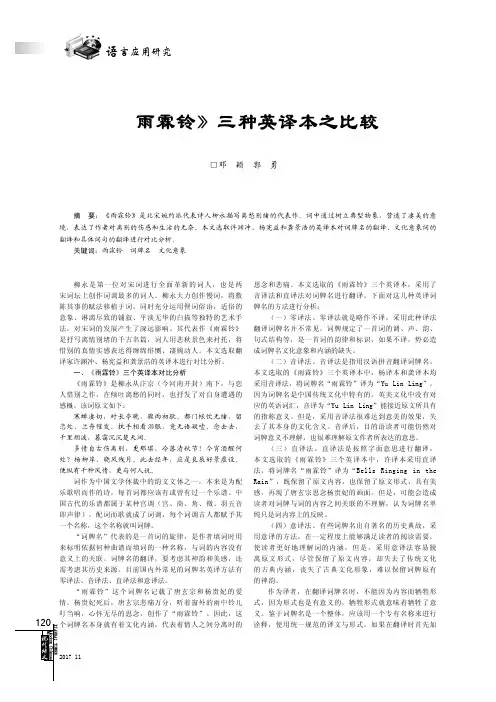
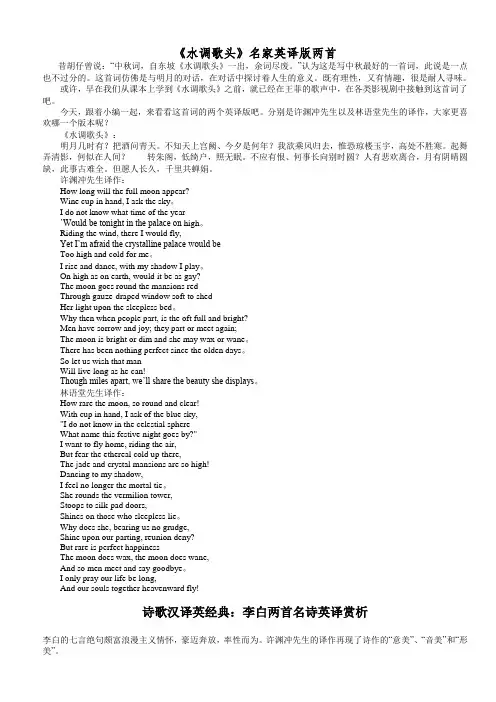
《水调歌头》名家英译版两首昔胡仔曾说:“中秋词,自东坡《水调歌头》一出,余词尽废。
”认为这是写中秋最好的一首词,此说是一点也不过分的。
这首词仿佛是与明月的对话,在对话中探讨着人生的意义。
既有理性,又有情趣,很是耐人寻味。
或许,早在我们从课本上学到《水调歌头》之前,就已经在王菲的歌声中,在各类影视剧中接触到这首词了吧。
今天,跟着小编一起,来看看这首词的两个英译版吧。
分别是许渊冲先生以及林语堂先生的译作,大家更喜欢哪一个版本呢?《水调歌头》:明月几时有?把酒问青天。
不知天上宫阙、今夕是何年?我欲乘风归去,惟恐琼楼玉宇,高处不胜寒。
起舞弄清影,何似在人间?转朱阁,低绮户,照无眠。
不应有恨、何事长向别时圆?人有悲欢离合,月有阴晴圆缺,此事古难全。
但愿人长久,千里共蝉娟。
许渊冲先生译作:How long will the full moon appear?Wine cup in hand, I ask the sky。
I do not know what time of the year’Would be tonight in the palace on high。
Riding the wind, there I would fly,Yet I’m afraid the crystalline palace would beToo high and cold for me。
I rise and dance, with my shadow I play。
On high as on earth, would it be as gay?The moon goes round the mansions redThrough gauze-draped window soft to shedHer light upon the sleepless bed。
Why then when people part, is the oft full and bright?Men have sorrow and joy; they part or meet again;The moon is bright or dim and she may wax or wane。
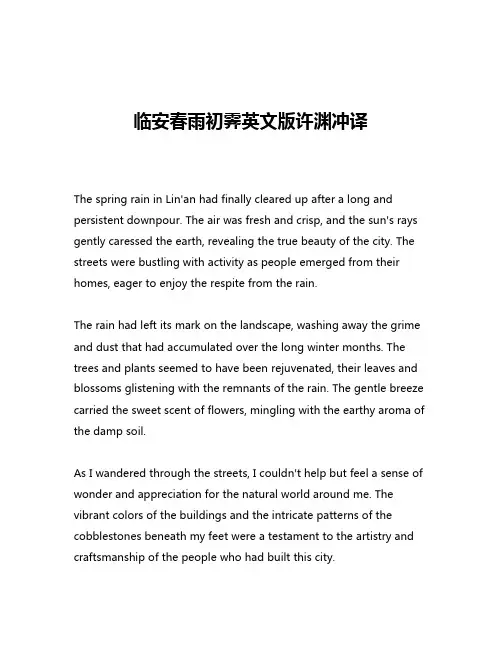
临安春雨初霁英文版许渊冲译The spring rain in Lin'an had finally cleared up after a long and persistent downpour. The air was fresh and crisp, and the sun's rays gently caressed the earth, revealing the true beauty of the city. The streets were bustling with activity as people emerged from their homes, eager to enjoy the respite from the rain.The rain had left its mark on the landscape, washing away the grime and dust that had accumulated over the long winter months. The trees and plants seemed to have been rejuvenated, their leaves and blossoms glistening with the remnants of the rain. The gentle breeze carried the sweet scent of flowers, mingling with the earthy aroma of the damp soil.As I wandered through the streets, I couldn't help but feel a sense of wonder and appreciation for the natural world around me. The vibrant colors of the buildings and the intricate patterns of the cobblestones beneath my feet were a testament to the artistry and craftsmanship of the people who had built this city.One of the most striking features of Lin'an was its rich history and cultural heritage. The city had been a center of learning and intellectual discourse for centuries, attracting scholars, poets, and artists from all over the region. The grand temples and pagodas that dotted the landscape were a testament to the deep spiritual beliefs of the people who had once called this place home.As I explored the city, I couldn't help but feel a sense of connection to the past. The winding streets and hidden alleyways seemed to whisper the stories of the generations who had walked these same paths before me. I could almost hear the laughter and chatter of the local residents as they went about their daily lives, their voices mingling with the gentle sounds of the wind and the occasional birdsong.One of the highlights of my visit was a trip to the famous West Lake, a breathtaking natural wonder that had inspired countless poets and artists over the centuries. As I stood on the shore, gazing out over the shimmering surface of the water, I was struck by the sense of peace and tranquility that permeated the air.The lake was surrounded by lush hills and dense forests, creating a serene and picturesque landscape that seemed almost otherworldly.I could imagine the scholars and poets of old sitting by the water's edge, composing their verses and contemplating the mysteries ofthe natural world.As I walked along the paths that wound through the gardens and pavilions that dotted the lake's shores, I couldn't help but feel a sense of reverence and awe. The intricate carvings and delicate architecture of the structures seemed to speak to the deep appreciation for beauty and craftsmanship that had been a hallmark of Lin'an's cultural legacy.One of the most striking features of the West Lake was the way it seemed to change with the seasons. In the spring, the cherry blossoms would bloom, painting the landscape in a soft, ethereal hue. In the summer, the lake would glisten in the sun, inviting visitors to take a refreshing dip. And in the autumn, the leaves would turn brilliant shades of red and gold, creating a breathtaking spectacle that would draw visitors from far and wide.As I wandered through the gardens and pavilions, I couldn't help but feel a sense of connection to the past. The stories and legends that had been passed down through the generations seemed to come alive in the very stones and trees that surrounded me. I could almost hear the echoes of the poets and scholars who had once walked these same paths, their words and ideas still resonating in the air.One of the most fascinating aspects of Lin'an's cultural heritage wasthe way it had been shaped by the influence of different dynasties and empires over the centuries. The city had been a hub of trade and commerce, attracting merchants and artisans from all over the region. This cross-pollination of cultures had led to a rich and diverse artistic tradition that was evident in the architecture, the crafts, and the cuisine of the city.As I explored the local markets and shops, I was struck by the incredible variety and quality of the goods on offer. From delicate silks and embroidered fabrics to intricate woodcarvings and exquisite porcelain, the artisans of Lin'an had clearly honed their skills over generations. I couldn't help but marvel at the level of craftsmanship and attention to detail that went into every item I encountered.One of the most memorable experiences of my visit was a visit to a local tea house, where I was able to sample a variety of traditional Chinese teas. The owner of the tea house was a knowledgeable and passionate guide, who took the time to explain the history and cultural significance of each type of tea. As I sipped the fragrant brews, I couldn't help but feel a sense of connection to the long and storied tradition of tea culture in China.Overall, my time in Lin'an was a truly transformative experience. The city's rich history, vibrant culture, and natural beauty left a lasting impression on me, and I left with a deep appreciation for theincredible diversity and complexity of Chinese civilization. Whether it was the intricate architecture, the delicate crafts, or the serene natural landscapes, every aspect of Lin'an seemed to speak to the deep artistry and creativity that had been a hallmark of this remarkable city for centuries.As I boarded the train to depart, I couldn't help but feel a sense of melancholy. I knew that I would miss the sights and sounds of Lin'an, the bustling streets, and the tranquil gardens. But I also knew that this was not the end of my journey, but rather the beginning of a lifelong fascination with the rich and diverse cultures of China. I vowed to return one day, to continue exploring the wonders of this remarkable place, and to deepen my understanding of the incredible legacy that it had left behind.。
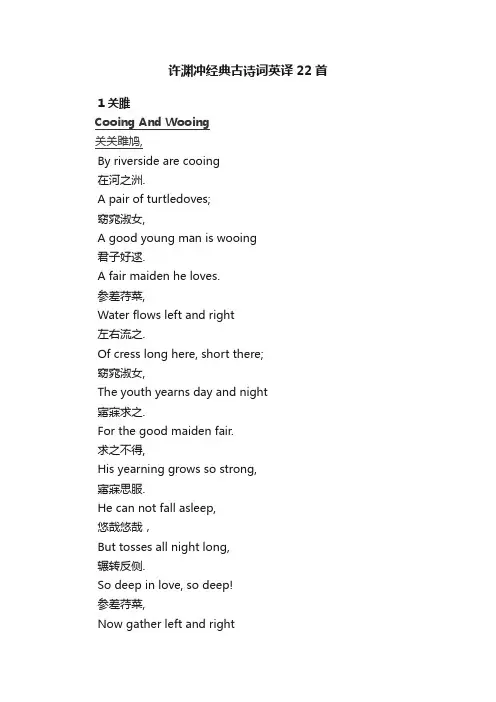
许渊冲经典古诗词英译22首1 关雎Cooing And Wooing关关雎鸠,By riverside are cooing在河之洲.A pair of turtledoves;窈窕淑女,A good young man is wooing君子好逑.A fair maiden he loves.参差荇菜,Water flows left and right左右流之.Of cress long here, short there;窈窕淑女,The youth yearns day and night寤寐求之.For the good maiden fair.求之不得,His yearning grows so strong,寤寐思服.He can not fall asleep,悠哉悠哉,But tosses all night long,辗转反侧.So deep in love, so deep!参差荇菜,Now gather left and right左右采之.Cress long or short and tender!窈窕淑女,O lute, play music bright琴瑟友之.For the bride sweet and slender!参差荇菜,Feast friends at left and right左右芼之.On cress cooked till tender!窈窕淑女,O bells and drums, delight钟鼓乐之.The bride so sweet and slender!2 垓下歌XIANG YU’S LAST SONG力拔山兮气盖世,I could pull mountains down, oh! With main and might, 时不利兮骓不逝。
But my good fortune wanes, oh! My steed won’t fight.骓不逝兮可奈何!Whether my steed will fight, oh! I do not care.虞兮虞兮奈若何!What can I do with you, oh! My lady fair!3 回乡偶书HOME-COMING贺知章He Zhizhang少小离家老大回,Old, I return to the homeland while young,乡音无改鬓毛衰。
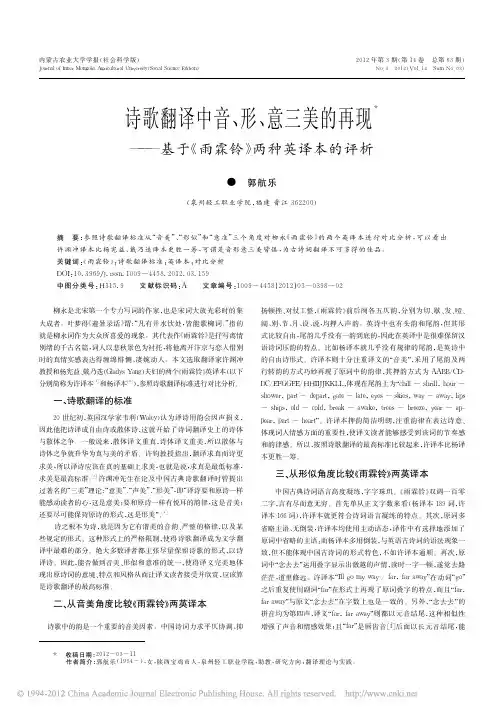
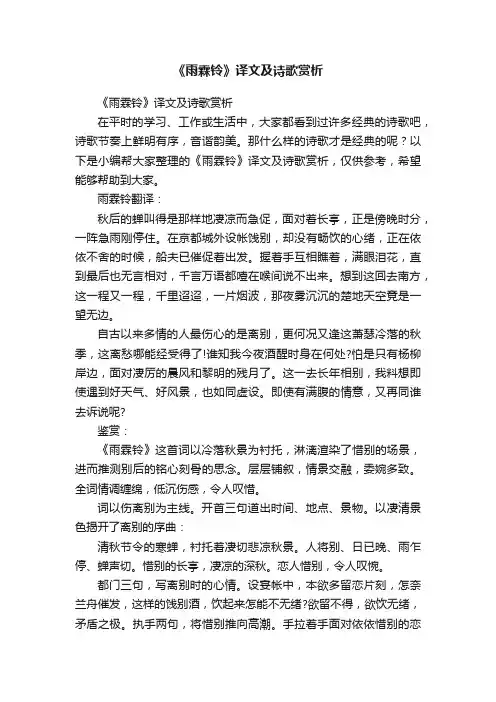
《雨霖铃》译文及诗歌赏析《雨霖铃》译文及诗歌赏析在平时的学习、工作或生活中,大家都看到过许多经典的诗歌吧,诗歌节奏上鲜明有序,音谐韵美。
那什么样的诗歌才是经典的呢?以下是小编帮大家整理的《雨霖铃》译文及诗歌赏析,仅供参考,希望能够帮助到大家。
雨霖铃翻译:秋后的蝉叫得是那样地凄凉而急促,面对着长亭,正是傍晚时分,一阵急雨刚停住。
在京都城外设帐饯别,却没有畅饮的心绪,正在依依不舍的时候,船夫已催促着出发。
握着手互相瞧着,满眼泪花,直到最后也无言相对,千言万语都噎在喉间说不出来。
想到这回去南方,这一程又一程,千里迢迢,一片烟波,那夜雾沉沉的楚地天空竟是一望无边。
自古以来多情的人最伤心的是离别,更何况又逢这萧瑟冷落的秋季,这离愁哪能经受得了!谁知我今夜酒醒时身在何处?怕是只有杨柳岸边,面对凄厉的晨风和黎明的残月了。
这一去长年相别,我料想即使遇到好天气、好风景,也如同虚设。
即使有满腹的情意,又再同谁去诉说呢?鉴赏:《雨霖铃》这首词以冷落秋景为衬托,淋漓渲染了惜别的场景,进而推测别后的铭心刻骨的思念。
层层铺叙,情景交融,委婉多致。
全词情调缠绵,低沉伤感,令人叹惜。
词以伤离别为主线。
开首三句道出时间、地点、景物。
以凄清景色揭开了离别的序曲:清秋节令的寒蝉,衬托着凄切悲凉秋景。
人将别、日已晚、雨乍停、蝉声切。
惜别的长亭,凄凉的深秋。
恋人惜别,令人叹惋。
都门三句,写离别时的心情。
设宴帐中,本欲多留恋片刻,怎奈兰舟催发,这样的饯别酒,饮起来怎能不无绪?欲留不得,欲饮无绪,矛盾之极。
执手两句,将惜别推向高潮。
手拉着手面对依依惜别的恋人,泪眼对着泪眼,纵有千言万语,因悲痛气塞而一句也说不出来。
这是分别时的情景。
对照苏东坡的悼亡妻的《江城子》中相顾无言,唯有泪千行我们能更好地理解。
念去去两句,则承上启下,笔随意转,有如浩瀚长江,一泻千里。
千里烟波,楚天空阔,设想到别后的道路遥远而漫长。
就此一别,人各东西,对情人的思念有如楚地的沉沉烟波,忧郁迷茫。
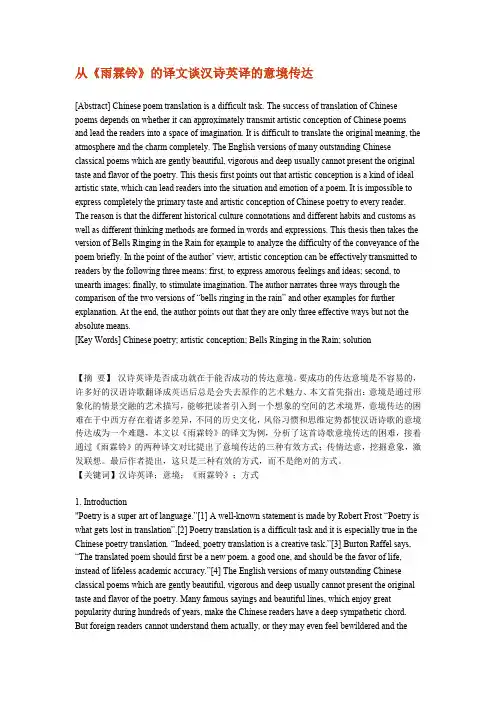
从《雨霖铃》的译文谈汉诗英译的意境传达[Abstract] Chinese poem translation is a difficult task. The success of translation of Chinese poems depends on whether it can approximately transmit artistic conception of Chinese poems and lead the readers into a space of imagination. It is difficult to translate the original meaning, the atmosphere and the charm completely. The English versions of many outstanding Chinese classical poems which are gently beautiful, vigorous and deep usually cannot present the original taste and flavor of the poetry. This thesis first points out that artistic conception is a kind of ideal artistic state, which can lead readers into the situation and emotion of a poem. It is impossible to express completely the primary taste and artistic conception of Chinese poetry to every reader. The reason is that the different historical culture connotations and different habits and customs as well as different thinking methods are formed in words and expressions. This thesis then takes the version of Bells Ringing in the Rain for example to analyze the difficulty of the conveyance of the poem briefly. In the point of the author’ view, artistic conception can be effectively transmitted to readers by the following three means: first, to express amorous feelings and ideas; second, to unearth images; finally, to stimulate imagination. The author narrates three ways through the comparison of the two versions of “bells ringing in the rain” and other examples for further explanation. At the end, the author points out that they are only three effective ways but not the absolute means.[Key Words] Chinese poetry; artistic conception; Bells Ringing in the Rain; solution【摘要】汉诗英译是否成功就在于能否成功的传达意境。
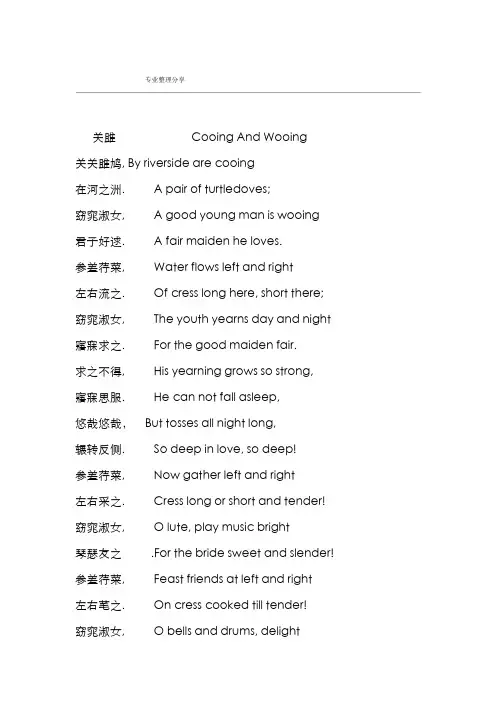
专业整理分享关雎Cooing And Wooing关关雎鸠, By riverside are cooing在河之洲. A pair of turtledoves;窈窕淑女, A good young man is wooing 君子好逑. A fair maiden he loves.参差荇菜, Water flows left and right左右流之. Of cress long here, short there; 窈窕淑女, The youth yearns day and night 寤寐求之. For the good maiden fair.求之不得, His yearning grows so strong,寤寐思服. He can not fall asleep,悠哉悠哉,But tosses all night long,辗转反侧. So deep in love, so deep!参差荇菜, Now gather left and right左右采之. Cress long or short and tender! 窈窕淑女, O lute, play music bright琴瑟友之.For the bride sweet and slender! 参差荇菜, Feast friends at left and right左右芼之. On cress cooked till tender!窈窕淑女, O bells and drums, delight钟鼓乐之. The bride so sweet and slender!垓下歌XIANG YU'S LAST SONG项羽XIANGYU力拔山兮气盖世,I could pull mountains down, oh! With main and might时不利兮骓不逝。
But my good fortune wanes, oh! My steed won't fight.骓不逝兮可奈何!Whether my steed will fight, oh! I do not格式DOC完美专业整理分享care.虞兮虞兮奈若何!What can I do with you, oh! My lady fair!回乡偶书HOME-COMING贺知章He Zhi zhang少小离家老大回,Old, I return to the homeland while young, 乡音无改鬓毛衰。
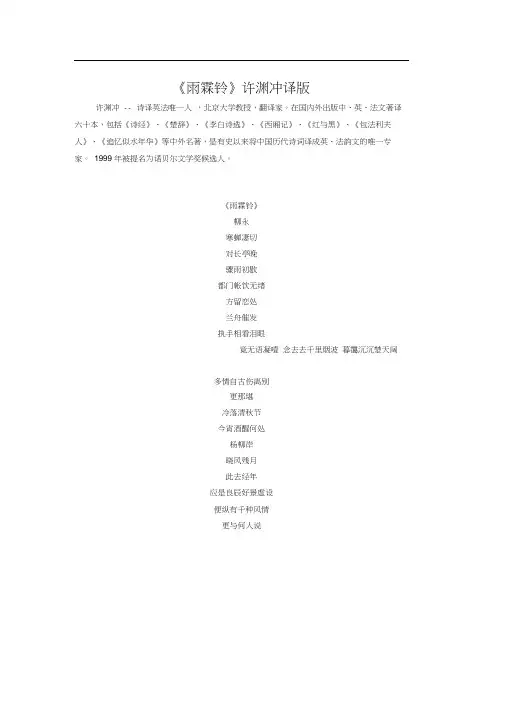
《雨霖铃》许渊冲译版许渊冲-- 诗译英法唯一人,北京大学教授,翻译家。
在国内外出版中、英、法文著译六十本,包括《诗经》、《楚辞》、《李白诗选》、《西厢记》、《红与黑》、《包法利夫人》、《追忆似水年华》等中外名著,是有史以来将中国历代诗词译成英、法韵文的唯一专家。
1999 年被提名为诺贝尔文学奖候选人。
《雨霖铃》柳永寒蝉凄切对长亭晚骤雨初歇都门帐饮无绪方留恋处兰舟催发执手相看泪眼竟无语凝噎念去去千里烟波暮霭沉沉楚天阔多情自古伤离别更那堪冷落清秋节今宵酒醒何处杨柳岸晓风残月此去经年应是良辰好景虚设便纵有千种风情更与何人说Cicadas chillAnd drearily shrill,We sta nd face to face at an eve ning hourBefore the pavili on, after a sudde n shower.Can I care for drinking before we part ?At the city gateWhere we're lin geri ng late,But the boat is wait ing for me to depart.Hand in hand, we gaze at each other's tearful eyes And burst into sobs with words con gealed on our lips.I'll go my wayFar, far awayOn miles and miles of misty waves where sail the ships, Evening clouds hang low in boun dless Souther n skies.Part ing lovers would grieve as of old.How could I sta nd this clear autu mn day so cold!Where shall I be found at day's early breakFrom wine awake ?Moored by a riverba nk pla nted with willow trees Ben eath the waning moon and in the morning breeze.ni be gone for a year.In vain would good times and fine scenes appear!However galla nt I am on my part,To whom can I lay bare my heart。
阐释学、接受美学影响下的翻译观•I. 阐释学,又称解释学,或诠释学(hermene utics)•广义:指对于文本之意义的理解和解释的理论或哲学。
涉及哲学、语言学、文学、文献学、历史学、宗教、艺术、神话学、人类学、文化学、社会学、法学等问题。
既是—门边缘学科和一种新的研究方法,又是一种哲学思潮。
•狭义:指局部解释学、一般解释学、哲学解释学等分支、学派。
•现代解释学的开创者是20世纪的德国哲学家M.海德格尔•50年代末德国哲学家H.-G.加达默尔把海德格尔的本体论与古典解释学结合起来,使哲学解释学成为一个专门的哲学学派•另外两位代表人物是德国的宗教解释学者R.K.B.鲍尔特曼(1884~1976)和意大利"解释学理论"的研究者E.贝蒂••1. 海德格尔的“前理解”:•由―先有‖(Vorhabe)、―先见‖(Vorsich t) 、―先识‖(有的译为―先设‖,Vorgrif f)三部分构成。
•―先有‖是指预先已有的文化习惯,包括理解主体所处的风俗、传统等。
对于译者:指译者特有的社会和思想文化背景、特定的民族心理结构,这些会对译者理解原文产生影响。
•―先见‖指的是预先已有的概念系统,大体包括理解主体所具有的知识结构。
•―先识‖指的是对理解对象预先的假设、构想。
•汉斯一格奥尔格·伽达默尔:•1)“前见”:被特定的历史、文化、语言所浸染, 根本无法自由选择或摆脱历史文化通过语言对自身的预先占有。
(与海德格尔的―前理解‖一致)•通俗地讲,就是理解者对任何事物的理解都融有个人在此之前所形成的知识、观点、情趣等要素,每个理解者自身所具有的前见不同, 造成他们理解对象时有不同的个性特点,展现出不同的风格,暗示了文本意义多元化理解的可能。
••2)“合法偏见”:他从海德格尔的前结构观念出发,认为―我的前见出自我的偏颇‖,没有―偏颇‖,没有理解的前结构,理解是不可能发生的。
许渊冲英译李白古诗十首(汉英对照)(文末赠书)许渊冲,生于1921年,北京大学教授,著名翻译家,著译有中、英、法文作品百余部,被誉为“诗译英法唯一人”。
中文著作有《翻译的艺术》《文学翻译谈》等;英文著作有《中诗英韵探胜——从诗经到西厢记》《逝水年华》等。
英文译著有《诗经》《唐诗三百首》《西厢记》等;法文译著有《中国古诗词三百首》等。
翻译过莎士比亚、德莱顿、雨果、司汤达、巴尔扎克等英法文学家的经典作品多部。
2010年获得中国翻译协会表彰个人的最高荣誉奖项——中国翻译文化终身成就奖。
2014年获得国际翻译界最高奖项之一——国际翻译家联盟(国际译联)2014“北极光”杰出文学翻译奖。
2020年获全球华人国学大典海外影响力奖。
/许渊冲英译李白诗十首/望天门山天门中断楚江开,碧水东流至此回。
两岸青山相对出,孤帆一片日边来。
Mount Heaven's Gate Viewed from AfarBreaking Mount Heaven's Gate, the great River rolls through,Its east-flowing green billows, hurled back here, turn north.From the two river banks thrust out the mountains blue,Leaving the sun behind, a lonely sail comes forth.静夜思床前明月光,疑是地上霜。
举头望明月,低头思故乡。
Thoughts on a Silent NightBefore my bed a pool of light—Is it hoarfrost upon the ground?Eyes raised, I see the moon so bright;Head bent, in homesickness I'm drowned.黄鹤楼送孟浩然之广陵故人西辞黄鹤楼,烟花三月下扬州。
许渊冲唐诗宋词英语翻译英⽂版 唐诗是中国古典诗歌的艺术⾼峰。
从⼀般研究成果来看,学者们都偏向于研究唐诗是触景⽣情、抒发胸臆的⽂学作品。
下⾯是店铺带来的许渊冲唐诗宋词英语翻译,欢迎阅读! 许渊冲唐诗宋词英语翻译篇⼀ 孟郊 烈⼥操 梧桐相待⽼,鸳鸯会双死; 贞妇贵殉夫,舍⽣亦如此。
波澜誓不起,妾⼼井中⽔。
Folk-song-styled-verse Meng Jiao A SONG OF A PURE-HEARTED GIRL Lakka-trees ripen two by two And mandarin-ducks die side by side. If a true-hearted girl will love only her husband, In a life as faithfully lived as theirs, What troubling wave can arrive to vex A spirit like water in a timeless well? 许渊冲唐诗宋词英语翻译篇⼆ 孟郊 游⼦吟 慈母⼿中线,游⼦⾝上⾐; 临⾏密密缝,意恐迟迟归。
谁⾔⼨草⼼,报得三春辉? Folk-song-styled-verse Meng Jiao A TRAVELLER\'S SONG The thread in the hands of a fond-hearted mother Makes clothes for the body of her wayward boy; Carefully she sews and thoroughly she mends, Dreading the delays that will keep him late from home. But how much love has the inch-long grass For three spring months of the light of the sun? 许渊冲唐诗宋词英语翻译篇三 七⾔古诗 陈⼦昂 登幽州台歌 前不见古⼈,后不见来者; 念天地之悠悠,独怆然⽽涕下。
“英语学习活动观”资料合集目录一、英语学习活动观视角下的初中英语阅读教学设计思路与实践过程二、基于英语学习活动观的高中英语阅读教学实践三、英语学习活动观在高中英语写作教学中的应用以高二《英语》选修6为例四、英语学习活动观指导下的中学英语深层阅读教学实践五、英语学习活动观指导下的高中英语项目式教学磨课经历六、基于英语学习活动观的高中英语阅读教学设计探究以同课异构阅读教学设计为例英语学习活动观视角下的初中英语阅读教学设计思路与实践过程本文旨在探讨英语学习活动观视角下的初中英语阅读教学设计思路与实践过程。
英语学习活动观强调学生在活动中通过合作、探究、实践等方式培养语言运用能力,而初中英语阅读教学则在整个英语学习中占据重要地位。
通过将学习活动观与初中英语阅读教学相结合,可以更好地帮助学生提高阅读能力和英语综合运用能力。
学习活动观是一种强调学生在活动中进行学习的理念。
在英语学习活动中,学生通过积极参与、合作探究、实践应用等方式,培养语言运用能力、思维能力和创新能力。
学习活动观具有以下特点:(1)以学习者为中心:强调学生在学习过程中的主体地位,教师作为引导者和帮助者,帮助学生进行自主学习和合作学习。
(2)活动多样性:学习活动可以是课堂内的讨论、角色扮演、演讲等,也可以是课堂外的调查、实践、社区参与等。
(3)合作学习:鼓励学生之间的合作与交流,通过互相学习、互相帮助,实现共同发展。
(4)评价多元化:采用多种评价方式,如自我评价、互相评价、教师评价等,以全面了解学生的学习情况和进步。
初中英语阅读教学设计是根据初中英语阅读教学目标和学生实际情况,设计教学内容、教学方法和教学流程,以帮助学生提高阅读能力和英语综合运用能力的过程。
在进行阅读教学设计时,应注意以下几点:(1)学生主体地位:尊重学生的主体地位,设计适合学生的阅读活动和任务,以激发学生的学习兴趣和主动性。
(2)任务真实性:尽量选择真实的阅读材料,设计真实的任务,以帮助学生了解英语语言的实际运用。
《孔雀东南飞》三种英译本比较
张琳琳
【期刊名称】《科教文汇》
【年(卷),期】2016(000)033
【摘要】《孔雀东南飞》是我国第一首同时也是最长的一首叙事诗,是乐府诗的巅峰之作.全文共三百六十五行,每行五个字,塑造多个人物形象,情节跌宕起伏,具有深刻的社会意义.目前,《孔雀东南飞》有多个国内外译本.本文选取了国外具有代表性的韦利译本,以及许渊冲、汪榕培两位中国翻译家的译本进行比较,探讨了三种译本各自对原文的处理方式,以及不同译本各自的特点.通过三种译本的比较,分析不同译本的侧重点,希望可以为以后的译本提供参考与借鉴.
【总页数】2页(P163-164)
【作者】张琳琳
【作者单位】华南理工大学广东·广州 510641
【正文语种】中文
【中图分类】H315.9
【相关文献】
1.《牡丹亭·标目》的三种英译本的比较研究 [J], 傅张萌;何大顺
2.《芙蓉女儿诔》英译本比较研究——以邦斯尔、霍克思、杨宪益三种英译本为例[J], 朱天发
3.《雨霖铃》三种英译本之比较 [J], 邓颖;郭勇
4.三评《玉台新咏》英译本——比较《孔雀东南飞》的两种译法 [J], 李贻荫
5.《芙蓉女儿诔》英译本比较研究——以邦斯尔、霍克思、杨宪益三种英译本为例[J], 朱天发[1]
因版权原因,仅展示原文概要,查看原文内容请购买。
基于柳永《雨霖铃》许渊冲译本的翻译美学探究蒋雯倩【摘要】《雨霖铃》是宋代词人柳永描写离愁别绪的佳作,文章通过赏析中国著名翻译家许渊冲译本Bells Ringing in the Rain,从\"三美论\"角度探讨在英译过程中如何最大限度地再现该词的美学特点,传递其神韵.认为译者在翻译诗歌时,应尽可能地挖掘其美学价值,更好地将翻译美学理论与中国古典诗词相结合,展现全方位的美.【期刊名称】《英语教师》【年(卷),期】2018(018)024【总页数】4页(P73-76)【关键词】翻译美学;《雨霖铃》;三美论;意境【作者】蒋雯倩【作者单位】212003,江苏镇江,江苏科技大学外国语学院【正文语种】中文引言诗歌是文学作品中最早出现的一种体裁,它用词精炼,意境深远,神形兼备,内涵丰富,且艺术风格独特。
译者在翻译诗歌时要作为两种语言之间的媒介,不仅做到忠实和达意,还应站在作者的角度还原诗词的意境。
王国维认为词以境界最为上,有境界则自成高格,自有名句,而这对于译者来说是一个极大的挑战。
《雨霖铃》是柳永仕途失意离开汴京的留别之作,全词基调低沉,以冷落凄凉的秋景衬托恋人之间难以割舍的离情,是展现意境美及韵律美的典范。
近年来,很多著名翻译家都对该词进行了英译,如杨宪益和龚景浩。
对比众多译本,许渊冲的译本(以下简称“许译本”)牢牢抓住了翻译美学的核心部分,再现了原词丰富的意蕴,值得深入探究。
一、翻译美学的内涵与特征翻译美学是一门把翻译与美学结合起来的学科,研究如何把美学理论应用到翻译活动中,如何用美学观点指导翻译,在翻译过程中创造美、揭示美。
在西方,美学起源于哲学,古罗马时期西塞罗针对文学翻译主张“辞章之美“,杰罗姆则提倡“自然之美”,泰特勒提出“忠实之美”,加切奇泽拉主张“艺术之美”。
在各家主张中,不难发现美学思想映照下的光辉。
关于美的定义,中外学者各有看法。
黑格尔(2009:142)认为“美就是理念的感性显现”。
《雨霖铃》许渊冲译版
许渊冲----诗译英法唯一人,北京大学教授,翻译家。
在国内外出版中、英、法文著译六十本,包括《诗经》、《楚辞》、《李白诗选》、《西厢记》、《红与黑》、《包法利夫人》、《追忆似水年华》等中外名著,是有史以来将中国历代诗词译成英、法韵文的唯一专家。
1999年被提名为诺贝尔文学奖候选人。
《雨霖铃》
柳永
寒蝉凄切
对长亭晚
骤雨初歇
都门帐饮无绪
方留恋处
兰舟催发
执手相看泪眼
竟无语凝噎
念去去千里烟波
暮霭沉沉楚天阔
多情自古伤离别
更那堪
冷落清秋节
今宵酒醒何处
杨柳岸
晓风残月
此去经年
应是良辰好景虚设
便纵有千种风情
更与何人说
Cicadas chill
And drearily shrill,
We stand face to face at an evening hour
Before the pavilion, after a sudden shower.
Can I care for drinking before we part?
At the city gate
Where we're lingering late,
But the boat is waiting for me to depart.
Hand in hand, we gaze at each other's tearful eyes And burst into sobs with words congealed on our lips.
I'll go my way
Far, far away
On miles and miles of misty waves where sail the ships, Evening clouds hang low in boundless Southern skies.
Parting lovers would grieve as of old.
How could I stand this clear autumn day so cold!
Where shall I be found at day's early break
From wine awake?
Moored by a riverbank planted with willow trees Beneath the waning moon and in the morning breeze.
I'll be gone for a year.
In vain would good times and fine scenes appear!
However gallant I am on my part,
To whom can I lay bare my heart?。